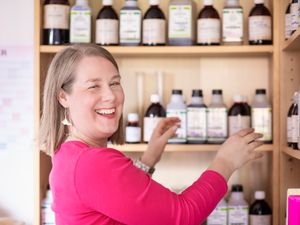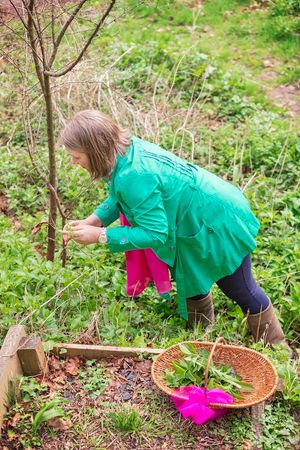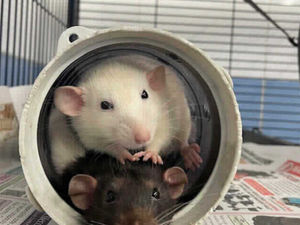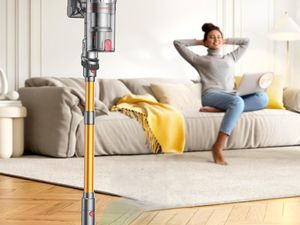The restorative power of herbs: What it's like to be a medicinal herbalist
After experiencing the benefits of alternative medicine from an early age, Hannah Charman is passionate about using her knowledge of herbs to help others.

As a teenager she was diagnosed with Chronic Fatigue Syndrome, which commonly causes extreme tiredness and makes it hard for someone to carry out ordinary daily activities.
With her GP unable to help, Hannah’s parents took her to see a homeopathic doctor in London and a combination of homeopathy, hypnotherapy and reiki got her back on her feet.
She had her heart set on becoming a vet but her experience kick-started a fascination with herbal medicine.
"I won the prize for GCSE French and the prize was a book token. I used it to buy a book about herbs," says Hannah, who is based in Highley.
In 1999 she graduated from Middlesex University with an honours degree in herbal medicine, and became a member of the National Institute of Medical Herbalists.
Hannah's studies included learning about the therapeutic properties of dozens of different herbs as well as anatomy and physiology as well as clinical and diagnostic skills.
Herbal medicine is made from plants, either the whole plant or sometimes parts of it such as leaves, flowers, roots or bark.
It has been used for thousands of years of treat a variety of conditions and illnesses and links can be traced back to Graeco-Roman, Arabic, European and American cultures.
Members of the National Institute of Medical Herbalists are trained in the same clinical examination skills as conventional GPs.
"Most people don't know what medicinal herbalists are, we are medically trained and can do things like carry out physical examinations and interpret blood test results," explains Hannah, who runs Physic Health Consulting.
"What we are doing is treating the whole person and the cause of the symptoms, not just the symptoms. We do that by mixing together different herbs."
She has more than 100 different herbs to choose from in her dispensary and personalised prescriptions are creating using around a dozen, depending on the patient's needs.
Some of the herbs used in her medicines are grown locally while others are sourced from around the world.

They include nettles, dandelions, lavender, chamomile and feverfew.
For prescriptions, she mainly uses tinctures, which is where the herb is cold infused in a mixture of alcohol and water.
Alternatively, she can use teas, capsules, creams, lotions, oils, nasal sprays or pessaries, whatever is best for the patient.
Hannah says the range of options available often surprises people as well as the speed at which they work and the lack of side effects.
During consultations Hannah can also use iridology, which is where the patterns and colours on the iris of the eye are studied to determine information about a patient's overall health.
For many years, Hannah has been helping women through menopause using natural remedies for a number of years, especially the third who can't or don't want to take HRT.
She makes a remedy up especially for each patient following a consultation with them, and offers dietary advice or advanced hypnotherapy to work alongside.
"I treat anything the NHS struggles to treat like Chronic Fatigue Syndrome, Long Covid, migraines, high blood pressure, arthritis and rehabilitation after cancer treatment," says Hannah, who is also a trained hypnotherapist.
Another way she is supporting women is by launching a menopause cafe in Much Wenlock on the first Tuesday of every month at the Second Story Space, above Life Unwrapped.
"There's been a lot of negativity around menopause in the media recently, and I wanted to help women to feel less scared and more positive about their transition.
"That's why my new cafes are aimed at self care and finding ways through without medication, although all women are welcome to come along," says 43-year-old Hannah.
She has realised from talking to friends and patients, as well as her own experience, that menopause can be a challenging time.
"There's growing support in the corporate world but those of us who work alone are a bit isolated," Hannah tells Weekend.
"I met one lady whose family had to move out, and many others who've left a career they loved, or closed their business because they couldn't carry on any longer.
"These women need support from people who understand them, and menopause cafes can be a lifeline, especially in rural areas."
To help people improve their overall health and wellbeing, Hannah also offers a number of dedicated programmes.
They include the ‘Better MySelf’ programme which show people how to become far more self-sufficient in looking after their own health.
For Hannah being a medicinal herbalist is incredibly rewarding with plenty of job satisfaction.
"What I enjoy most is when people come back to me and say they feel better. It's also empowering for women to be in charge of their own treatment which doesn't happen with HRT," she tells Weekend.
Menopause cafe places cost £5 each, which includes good coffee and cake, and can be booked by emailing Hannah at Hannah@physichealth.uk





